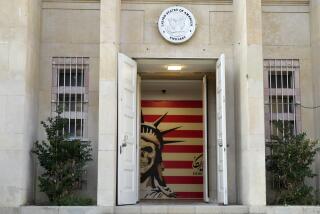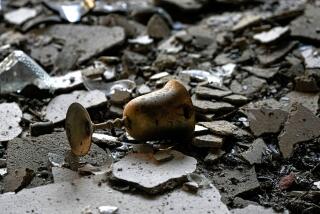In Iran, a cultural clash over shuttered film institute
TEHRAN — A spat over the possible reopening of a shuttered film institute is pitting Iran’s culture overseers against an alliance of moviemakers and cinema buffs emboldened by the victory of moderate Hassan Rouhani in June’s presidential balloting.
The controversy about the House of Cinema, which was shut down by the government two years ago, is exposing some of the deep fault lines in the Islamic Republic that extend beyond politics to culture and other aspects of Iranian life.
In the case of film, the clerical leadership and its hard-liner allies generally favor promotion of what they view as “revolutionary and Islamic cinema,” while liberals have a broader vision of the possibilities of motion pictures.
For more than two decades, the House of Cinema stood as a kind of guild and gathering spot for motion-picture fans and industry employees, representing the interests of more than 5,000 movie professionals. The building near downtown Tehran includes a small theater, a library and administrative offices.
The Ministry of Culture and Islamic Guidance summarily closed the institution in 2011, saying it was operating without a proper permit.
Many claimed that the closing was a political act. Cultural conservatives had long assailed the House of Cinema and its devotees as promoters of secular, pro-Western views.
Iran has an extensive movie industry. Most of the films are made for internal consumption, but Iranians have also produced widely admired movies that have been seen across the world. Some of the films have been banned at home.
A number recent films have garnered international prizes, notably Asghar Farhadi’s “A Separation,” about the marital travails of a middle-class couple in contemporary Iran, which won an Oscar in 2012 for best foreign-language film.
Some say the institution’s shutdown fit a pattern of government slap-downs of independent guilds, especially in the arts and athletics. Now cinema industry activists are pushing for the House of Cinema to be revived.
Backing their cause is none other than outgoing President Mahmoud Ahmadinejad, who will step down from office this weekend, after eight years in power, to be replaced by Rouhani. Ahmadinejad, who has often clashed with the clerical leadership, has ordered the House of Cinema reopened as one of his last presidential edicts. But the culture ministry has refused to comply, drawing outrage from cinephiles and those in the movie industry.
“The president has made orders but to this day they have not been met because of the problems created by the ministry,” Farhad Tohidi, former chairman of the House of Cinema, told Press TV, Iran’s English-language news channel.
Reformist dailies and Press TV have reported sympathetically on efforts to reopen the House of Cinema. The culture minister dodged a question from Press TV when asked directly how he planned to respond.
There seems to be considerable enthusiasm on the streets of Tehran for the notion of greater independence in the cultural and educational spheres.
“I don’t know which faction, hard-liners or reformists, will be victorious in the future,” said Mohammad Reza Ayyobi, 35, a sportswriter and cinema fan. “But I am in favor of an independent House of Cinema.”
On July 18, about 100 actors, directors and industry activists staged a rally demanding that the House of Cinema be reopened as the president directed. The crowd waved banners and fliers denouncing the inaction on the order and tried to pry open the center’s locked doors.
But cultural conservatives are fighting back, linking the prospective reopening to the so-called Green Movement, the pro-reform wave of street protests over allegations of vote-rigging in the 2009 elections in which Ahmadinejad was reelected. Authorities crushed the protest movement.
The conservative Kayhan daily said “seditionists” were behind the revival, clearly linking those pushing for the institution’s renewal to the 2009 movement.
“There is an unprecedented provocation to seize the House of Cinema in an unlawful manner,” the hard-line newspaper stated in an editorial.
During the election campaign, Rouhani threw his weight behind unions and guilds, saying the government should not meddle in their affairs, which apparently helped fuel the House of Cinema revival campaign.
With Rouhani now set to take office, some conservatives seem worried about the reappearance of long-repressed reformists in various sectors, especially education.
“God forbid, if ... a pro-sedition higher education minister or deans of universities are appointed or if a secular current begins to penetrate the university campuses,” Mohammad Kazem Sadighi, a conservative prayer leader, said in a recent sermon.
Special correspondents Mostaghim reported from Tehran and Sandels from Beirut. Times staff writer Patrick J. McDonnell in Beirut contributed to this report.
More to Read
Start your day right
Sign up for Essential California for news, features and recommendations from the L.A. Times and beyond in your inbox six days a week.
You may occasionally receive promotional content from the Los Angeles Times.






